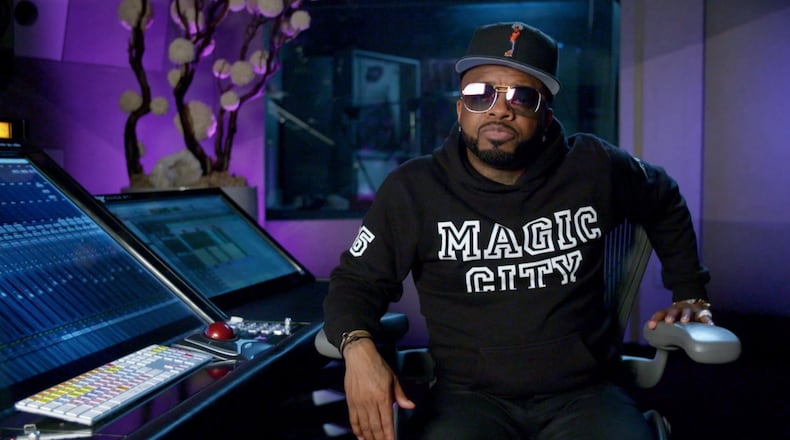From the concert footage at October's So So Def 25th anniversary concert at State Farm Arena to the shots of Jermaine Dupri behind the console in his studio clad in a Magic City hoodie, "Power, Influence and Hip-Hop: The Remarkable Rise of So So Def" is steadfastly Atlanta.
The new documentary, which debuts on WE tv at 10 p.m. Thursday, spotlights the numerous accomplishments of Dupri, a superstar producer and songwriter (and, as we see in precious old footage, a dancer) who was inducted into the Songwriters Hall of Fame last year, a few months before celebrating the 25th anniversary of the So So Def record label he created.
The brisk glimpse into Dupri’s evolution includes interviews with a colorful Snoop Dogg (who discovered Dupri protégé Bow Wow) and a candid Mariah Carey (with whom Dupri collaborated on her 2005 comeback album, “The Emancipation of Mimi”). Da Brat, whose career Dupri fostered after she migrated from Chicago to Atlanta and Usher, the Atlanta music icon who is the face and voice of a signature Dupri production work, 2004’s “Confessions,” also pop up throughout, as does Dupri’s mother, Tina.
Material for “Power, Influence and Hip-Hop” was filmed about five months ago in Atlanta and Los Angeles, where Dupri shares the story of writing Usher’s “Confessions Part II” while driving down Beverly Boulevard.
Squeezing Dupri’s significant career into less than an hour of TV leaves the viewer with a desire to learn more, though famous facets of his life, including his well-publicized relationship with Janet Jackson and his comfortable rapport with Carey, are detailed.
Calling last week from a car in New York, where he was visiting to do more press for the documentary, Dupri talked about the mall culture that helped establish his early-’90s breakthrough act Kris Kross, his impact on the legacy of Atlanta music and what he was most surprised to hear people say about him.
Q: What is the background about how this documentary came together?
A: We had been talking about a documentary about songs I had written. I tried to do that, but it never came to light. I talked to WE (tv) about a documentary, and we filmed the Atlanta (So So Def anniversary) concert, and I knew the concert was going to be a great backdrop. But when I watch this documentary, I'm like, where is the footage from the concert? It doesn't show a lot of the artists from the show or the dynamic of one person being able to have a concert with that many artists. I just feel like I need to more time (in a documentary). I feel like it's set up for more, like maybe a movie.
Q: What did you want people to learn about you from watching this?
A: I want people to know more about Jermaine Dupri. Everything you see me do, these are connected pieces. People look at it like, they used Snoop (for an interview) because he's colorful, but Snoop gave me Bow Wow. We had a relationship through an artist, so there's such a bigger connection to things going on. We see a lot of people in this industry that try to connect dots that don't really exist.
Q: It’s funny to be reminded of how important the mall culture was in getting Kris Kross and some others discovered. But people supposedly don’t hang out in malls anymore.
A: That's not true. The mall is still that same thing in Atlanta. I can't go to Lenox (Square) on a Saturday. There are so many kids in the mall with CDs, walking around and trying to give out their flash drives. Lenox is the Greenbriar of today. I went there about five or six months ago and I was like, 'Why is this kid dressed like this?' They're doing full-on concerts with complete outfits and everything. And then I realized, they're waiting for someone like me to walk in and to give their stuff to. Soon as I get out of the car, boom! That's an Atlanta thing.
Q: I talked to Dallas Austin recently about you inducting him into the Songwriters Hall of Fame (an honor Dupri received in 2018). Do you think people realize what the two of you have done for the Atlanta music scene?
A: Unfortunately, Atlanta, it doesn't remind you a lot. It's an interesting city when it comes to the artists, but the city doesn't do a lot of reminding people of what (others accomplished). Living in Atlanta, you don't really pay attention to how much impact you're putting on the city. I think Dallas and I both stand in that position.
Q: How did you feel about your mom being in the documentary?
A: (Laughs) I get the opportunity to see how other people view my life, which is very interesting. You don't understand when you walk into a room, people view your life differently than you do. That's an interesting take you get from the whole thing.
Q: What were you surprised to find out?
A: The Janet (Jackson) stuff. I thought people around me thought the same way I was thinking; this relationship was cool, but it's over. But there were people around me wishing (we) would get back together. I was like, that's crazy! If you bring a new girl around, they'll be like, we don't want you around if you're trying to get him and Janet back together!
Q: You say at the end of the documentary that in the next 25 years, you’re going to make the biggest album in the history of music. How do you know when you’ll find it?
A: I do believe in putting the energy in the universe. The people around me, they can say "Confessions" and "Emancipation (of Mimi)" were the biggest two records of that generation, and I never thought I'd be responsible for what people say are the two biggest albums of that period in the R&B genre. It's me not feeling that I accomplished so much that I believe will push me to create (the biggest album in history).
TV PREVIEW
“Power, Influence and Hip-Hop: The Remarkable Rise of So So Def”
10 p.m. Thursday on WE tv.
About the Author
Keep Reading
The Latest
Featured





